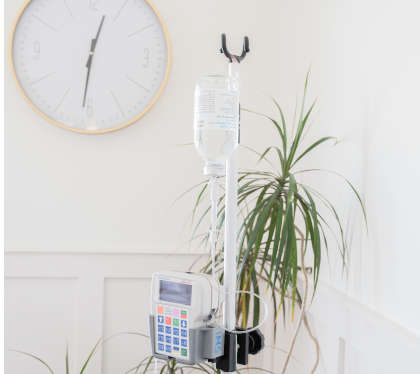
Liệu pháp truyền dịch tại nhà (HIT) là một phương pháp thay thế an toàn và hiệu quả, cho phép bệnh nhân được điều trị và dùng thuốc ngay tại nhà thay vì phải đến bệnh viện. Trong những năm gần đây, nhu cầu sử dụng liệu pháp truyền dịch tại nhà của bệnh nhân đã tăng lên đáng kể nhờ dịch vụ chăm sóc cá nhân hóa, tiện lợi và chất lượng cao mà nó mang lại.
Hỏi về dịch truyền IVIG tại nhà
Trong thực tế, nghiên cứu đã chứng minh rằng những bệnh nhân được truyền dịch tại nhà có kết quả sức khỏe tốt hơn, bao gồm tỷ lệ nhiễm trùng thấp hơn và thời gian phục hồi nhanh hơn.
Do đó, nếu bạn mắc bệnh mãn tính có thể theo dõi và kiểm soát tại nhà, bạn có thể chuyển sang liệu pháp truyền dịch tại nhà bằng cách tham khảo ý kiến của nhà cung cấp dịch vụ chăm sóc sức khỏe.
Trong bài viết này, chúng ta sẽ xem xét kỹ hơn về liệu pháp truyền dịch tại nhà, những lợi ích tiềm năng, các loại hình và một số thách thức phổ biến cần cân nhắc trước khi chuyển từ bệnh viện sang chăm sóc tại nhà.
Liệu pháp truyền dịch tại nhà
Bệnh nhân mắc bệnh mãn tính hoặc đang hồi phục sau phẫu thuật có thể được dùng thuốc (như thuốc kháng sinh, thuốc sinh học, steroid hoặc các yếu tố đông máu), dịch truyền hoặc dinh dưỡng ngay tại nhà.
Y tá truyền dịch tại nhà được đào tạo hoặc người chăm sóc sẽ tiêm thuốc hoặc dịch theo đơn trực tiếp vào cơ thể bệnh nhân theo đường dưới da hoặc đường tĩnh mạch (qua ống thông IV vào tĩnh mạch).
Hàng năm, có hơn 1,2 triệu lượt truyền dịch được thực hiện tại nhà thông qua ống thông trung tâm được đưa vào ngoại vi (PICC), cổng hoặc ống thông trung tâm.
Lợi ích tiềm năng của liệu pháp truyền dịch tại nhà
Liệu pháp truyền dịch tại nhà mang lại nhiều lợi ích hơn so với phương pháp truyền dịch tại bệnh viện, khiến liệu pháp này trở thành một lựa chọn hấp dẫn cho bệnh nhân. Một số lợi ích đáng kể của việc lựa chọn liệu pháp truyền dịch tại nhà như sau:
1. Sự tiện lợi và thoải mái
Một trong những lợi thế lớn của liệu pháp truyền dịch tại nhà là mang lại sự thoải mái cho bệnh nhân. Với liệu pháp truyền dịch tại nhà, bệnh nhân có thể nhận được liều lượng hoặc dinh dưỡng theo toa hàng ngày ngay tại nhà, bên cạnh những người thân yêu. Hơn nữa, liệu pháp này còn giúp giảm thiểu việc phải đến bệnh viện. Bệnh nhân gặp khó khăn trong việc di chuyển hoặc sống xa trung tâm y tế có thể tiết kiệm thời gian, năng lượng và chi phí đi lại.
Xét về sự tiện lợi, liệu pháp truyền dịch tại nhà mang lại sự linh hoạt cho những bệnh nhân cần truyền dịch thường xuyên hoặc dài hạn. Liệu pháp này cho phép họ dễ dàng kết hợp các liệu pháp vào thói quen hàng ngày mà không làm gián đoạn các hoạt động chuyên môn và cá nhân.
2. Chăm sóc cá nhân hóa và cải thiện kết quả điều trị cho bệnh nhân
Mỗi bệnh nhân cần được chăm sóc cá nhân hóa tùy theo tình trạng bệnh. Liệu pháp truyền dịch tại nhà cung cấp dịch vụ chăm sóc cá nhân hóa và lấy bệnh nhân làm trung tâm, nơi bạn sẽ hợp tác chặt chẽ với nhà cung cấp dịch vụ chăm sóc sức khỏe để xây dựng kế hoạch điều trị phù hợp với nhu cầu và sở thích y tế cụ thể của bạn.
Ngoài ra, phương pháp chăm sóc cá nhân này cải thiện sức khỏe tổng thể của bệnh nhân và cho phép các nhà cung cấp dịch vụ chăm sóc sức khỏe theo dõi sự cải thiện hàng ngày của bệnh nhân và quản lý các tác dụng phụ (nếu chúng xảy ra).
3. Hiệu quả chi phí
Liệu pháp truyền dịch tại nhà thường là ít tốn kém hơn so với liệu pháp truyền dịch nội trú, vì nó giúp giảm chi phí nằm viện, tiền phòng và chi phí chung. Tuy nhiên, chi phí truyền dịch tại nhà và truyền dịch tại bệnh viện có thể khác nhau tùy thuộc vào loại bệnh được điều trị.
Theo Trung tâm truyền dịch tại nhà quốc gia, một lần truyền dịch chống nhiễm trùng tại nhà có thể tốn $122/ngày, trái ngược với $798/ngày cho bệnh nhân nội trú. Tương tự như vậy, đánh giá có hệ thống Trong số 253 bài báo, chi phí truyền dịch tại nhà thấp hơn đáng kể so với truyền dịch tại cơ sở y tế. Ví dụ, bệnh nhân mắc bệnh máu khó đông có thể tiết kiệm từ $1.928 đến $2.974 cho mỗi liệu trình điều trị.
Truyền dịch tại nhà – Chúng tôi đến với bạn
4. Giảm tiếp xúc với môi trường truyền nhiễm
Với liệu pháp truyền dịch tại nhà, bạn sẽ ít tiếp xúc với môi trường lây nhiễm hơn. Do đó, đây là lựa chọn tốt hơn cho những người có hệ miễn dịch suy yếu. Không giống như các cơ sở truyền dịch tại bệnh viện và phòng khám, vốn là điểm nóng của các tác nhân gây bệnh và bệnh truyền nhiễm, liệu pháp truyền dịch tại nhà mang đến một môi trường sạch sẽ và an toàn, giảm thiểu tiếp xúc với các tác nhân lây nhiễm.
Trong một số trường hợp, bệnh nhân được truyền dịch tại nhà có thể bị nhiễm trùng nếu không tuân thủ đúng các kỹ thuật vô trùng. Tuy nhiên, tỷ lệ nhiễm trùng chung ở những bệnh nhân được truyền dịch tại nhà nhìn chung thấp hơn so với bệnh viện.
Một số bệnh nhiễm trùng phổ biến có thể xảy ra do môi trường vệ sinh kém là nhiễm trùng do vi khuẩn liên quan đến ống thông và nhiễm trùng máu liên quan đến đường truyền trung tâm.
5. Chất lượng cuộc sống được cải thiện
Bệnh nhân được truyền dịch tại nhà có nhiều khả năng cải thiện chất lượng cuộc sống. Với liệu pháp tại nhà, bệnh nhân cảm thấy tự lập hơn. Ngoài ra, việc dành thời gian cho người thân giúp cải thiện sức khỏe tinh thần và mang lại cho họ cái nhìn lạc quan hơn về lộ trình điều trị.
Các loại liệu pháp truyền dịch tại nhà phổ biến

Có một số loại liệu pháp truyền dịch tại nhà phổ biến, được áp dụng cho bệnh nhân tùy theo tình trạng bệnh của họ:
Liệu pháp kháng sinh IV
Liệu pháp này thường được sử dụng để điều trị các bệnh nhiễm trùng kháng thuốc như viêm tủy xương (viêm xương), viêm nội tâm mạcvà một số bệnh nhiễm trùng da. Truyền kháng sinh tại nhà giúp bệnh nhân tránh phải nằm viện kéo dài.
Quản lý cơn đau
Những người đang hồi phục sau phẫu thuật hoặc bị đau mãn tính có thể được điều trị giảm đau tại nhà bằng cách truyền thuốc giảm đau hoặc thuốc gây mê để kiểm soát cơn đau.
Liệu pháp immunoglobulin (IVIG)
Liệu pháp IVIG thường được khuyến nghị để điều trị các tình trạng liên quan đến miễn dịch và có thể được thực hiện tại nhà cho những người cần truyền dịch thường xuyên trong thời gian dài.
Điều trị hóa trị
Một số phương pháp điều trị hóa trị có thể được thực hiện tại nhà khi tình trạng bệnh nhân ổn định và không cần theo dõi chuyên sâu.
Liệu pháp tim mạch/tăng co bóp cơ tim
Bệnh nhân bị suy tim hoặc sốc tim được truyền thuốc qua đường tĩnh mạch liên tục tại nhà để giúp cơ tim co bóp bình thường.
Liệu pháp hydrat hóa
Liệu pháp này cung cấp vitamin, chất lỏng và thuốc trực tiếp vào máu của bệnh nhân để giúp giảm nhanh chóng tình trạng nôn nao, mệt mỏi do lệch múi giờ, mất nước.
Hỗ trợ dinh dưỡng (TPN/EN)
Những người có chức năng đường tiêu hóa bị suy giảm sẽ được truyền tĩnh mạch các chất dinh dưỡng thiết yếu (protein, carbohydrate, vitamin, chất điện giải, v.v.) tại nhà để đáp ứng nhu cầu dinh dưỡng của cơ thể và ngăn ngừa suy dinh dưỡng.
Nói chuyện với một chuyên gia
Về Trợ cấp đồng thanh toánTiêu chí đủ điều kiện cho liệu pháp truyền dịch tại nhà (HIT)
Không phải ai cũng đủ điều kiện để sử dụng liệu pháp truyền dịch tại nhà. Phương pháp này chỉ dành cho những bệnh nhân có tình trạng sức khỏe ổn định và có thể điều trị tại nhà một cách an toàn. Liệu pháp truyền dịch tại nhà có thể là một lựa chọn tốt cho:
- Bệnh nhân cần điều trị IV dài hạn do các bệnh mãn tính như bệnh truyền nhiễm, suy giảm miễn dịch, Bệnh Crohn (bệnh đường tiêu hóa), rối loạn thấp khớp, bệnh tự miễn, tình trạng viêm và ung thư.
- Bệnh nhân bị thiếu hụt dinh dưỡng hoặc kém hấp thu.
- Bệnh nhân không thể tiếp cận cơ sở chăm sóc sức khỏe do vấn đề di chuyển.
Những thách thức và những cân nhắc khác
Mặc dù liệu pháp truyền dịch tại nhà mang lại nhiều lợi ích nhưng cũng có một số thách thức mà bạn với tư cách là bệnh nhân hoặc người chăm sóc phải cân nhắc để đảm bảo tính an toàn và hiệu quả của liệu pháp này.
1. Đào tạo bệnh nhân và người chăm sóc
Đào tạo không đúng cách có thể dẫn đến kết quả bất lợi hoặc biến chứng, chẳng hạn như các vấn đề liên quan đến ống thông tĩnh mạch trung tâm dùng để truyền dịch, tắc ống thông, nhiễm trùng đường truyền tĩnh mạch trung tâm hoặc sai sót trong quá trình dùng thuốc. Do đó, bạn phải được đào tạo bài bản về cách dùng thuốc, xử lý tác dụng phụ, cũng như cách sử dụng thiết bị và thuốc.
2. Nguy cơ nhiễm trùng
Vệ sinh kém có thể làm tăng nguy cơ nhiễm trùng, bao gồm nhiễm trùng máu liên quan đến đường truyền trung tâm, huyết khối tắc mạch tĩnh mạch, viêm tĩnh mạch, và tắc nghẽn. Bạn có thể giảm thiểu hoặc kiểm soát nguy cơ nhiễm trùng bằng cách tuân thủ nghiêm ngặt các kỹ thuật vô trùng.
Ngoài ra, hãy đảm bảo bạn có nơi an toàn và bảo mật để cất giữ thuốc và thiết bị y tế.
3. Bảo hiểm
Liệu pháp truyền dịch tại nhà có thể tốn kém nếu bảo hiểm của bạn không chi trả toàn bộ chi phí thuốc men và thiết bị truyền dịch. Do đó, bạn nên kiểm tra kỹ gói bảo hiểm của mình trước khi chuyển từ bệnh viện sang chăm sóc tại nhà.
4. Căng thẳng tâm lý và kiệt sức
Bạn có thể cảm thấy bị cô lập hoặc căng thẳng khi tự mình điều trị. Kiệt sức cũng là tình trạng phổ biến ở những người chăm sóc. Việc tìm kiếm sự tư vấn hoặc nghỉ ngơi có thể giúp giảm bớt căng thẳng cho bệnh nhân và kiệt sức ở những người chăm sóc.
Phần kết luận
Liệu pháp truyền dịch tại nhà là một phương pháp hiệu quả và an toàn cho những bệnh nhân ổn định và đủ điều kiện điều trị tại nhà. Bên cạnh những lợi ích, cũng có một số thách thức cần cân nhắc trước khi bắt đầu liệu pháp.
Nếu bạn hoặc người thân của bạn có ý định chuyển sang liệu pháp truyền dịch tại nhà, bạn nên tham khảo ý kiến của nhà cung cấp dịch vụ chăm sóc sức khỏe để tìm hiểu xem liệu đây có phải là lựa chọn phù hợp với bạn hay không.
TÀI LIỆU THAM KHẢO:
- Fields, BE, Whitney, RL, & Bell, JF (2020). Quản lý liệu pháp truyền dịch tại nhà. AJN Tạp chí Điều dưỡng Hoa Kỳ, 120(12), 53–59. https://doi.org/10.1097/01.naj.0000724252.22812.a2
- Polinski, JM, Kowal, MK, Gagnon, M., Brennan, TA, & Shrank, WH (2017). Truyền dịch tại nhà: An toàn, hiệu quả lâm sàng, được bệnh nhân ưa chuộng và tiết kiệm chi phí. Chăm sóc sức khỏe, 5(1-2), 68-80. https://doi.org/10.1016/j.hjdsi.2016.04.004
- Rentala, M., Andrews, S., Tiberio, A., Alagappan, K., Tavdy, T., Sheppard, P., & Silverman, R. (2016). Liệu pháp truyền dịch tĩnh mạch tại nhà được thiết lập từ một đơn vị quyết định lâm sàng 24 giờ cho bệnh nhân viêm mô tế bào. Tạp chí Y học Cấp cứu Hoa Kỳ, 34(7), 1273-1275. https://doi.org/10.1016/j.ajem.2016.04.022
- Gorski, LA (2019). Tác động của liệu pháp truyền dịch tại nhà đối với người chăm sóc. Hội thảo về Điều dưỡng Ung thư, 35(4), 370-373. https://doi.org/10.1016/j.soncn.2019.06.010
- Martel, D. (2012). Liệu pháp truyền dịch trong chăm sóc tại nhà. Y tá chăm sóc sức khỏe tại nhà, 30(9), 506–514. https://doi.org/10.1097/nhh.0b013e31826a679c













